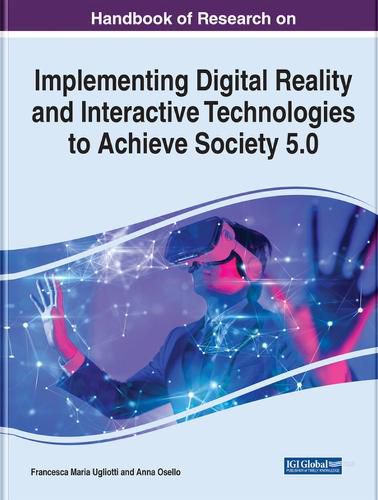Readings Newsletter
Become a Readings Member to make your shopping experience even easier.
Sign in or sign up for free!
You’re not far away from qualifying for FREE standard shipping within Australia
You’ve qualified for FREE standard shipping within Australia
The cart is loading…






This title is printed to order. This book may have been self-published. If so, we cannot guarantee the quality of the content. In the main most books will have gone through the editing process however some may not. We therefore suggest that you be aware of this before ordering this book. If in doubt check either the author or publisher’s details as we are unable to accept any returns unless they are faulty. Please contact us if you have any questions.
Research on digital reality has been extensive in recent years, covering a wide range of topics and leading to new ways to approach and deal with complex situations. Within the Society 5.0 paradigm, people and machines establish a positive relationship to find solutions for social aspects and problems. This perspective establishes a strong interconnection between physical and virtual space, making the user an active player for better life and society. In these terms, digital systems and virtual and augmented reality technologies enable multi-dimensional scenarios and additional levels of interdisciplinary collaboration to create a highly inclusive communication network and social framework.
The Handbook of Research on Implementing Digital Reality and Interactive Technologies to Achieve Society 5.0 provides an overview of methods, processes, and tools adopted to achieve super-smart society needs by exploiting digital reality and interactive technologies. It includes case studies that illustrate applications that place people's quality of life at the center of the digitalization process, accessing and managing different information and data domains. Covering topics such as cultural heritage, interactive learning, and virtual participation, this major reference work is a comprehensive resource for business executives and managers, IT managers, government officials, community leaders, arts and performance organizers, healthcare administrators and professionals, faculty and administrators of both K-12 and higher education, students of higher education, researchers, and academicians.
$9.00 standard shipping within Australia
FREE standard shipping within Australia for orders over $100.00
Express & International shipping calculated at checkout
This title is printed to order. This book may have been self-published. If so, we cannot guarantee the quality of the content. In the main most books will have gone through the editing process however some may not. We therefore suggest that you be aware of this before ordering this book. If in doubt check either the author or publisher’s details as we are unable to accept any returns unless they are faulty. Please contact us if you have any questions.
Research on digital reality has been extensive in recent years, covering a wide range of topics and leading to new ways to approach and deal with complex situations. Within the Society 5.0 paradigm, people and machines establish a positive relationship to find solutions for social aspects and problems. This perspective establishes a strong interconnection between physical and virtual space, making the user an active player for better life and society. In these terms, digital systems and virtual and augmented reality technologies enable multi-dimensional scenarios and additional levels of interdisciplinary collaboration to create a highly inclusive communication network and social framework.
The Handbook of Research on Implementing Digital Reality and Interactive Technologies to Achieve Society 5.0 provides an overview of methods, processes, and tools adopted to achieve super-smart society needs by exploiting digital reality and interactive technologies. It includes case studies that illustrate applications that place people's quality of life at the center of the digitalization process, accessing and managing different information and data domains. Covering topics such as cultural heritage, interactive learning, and virtual participation, this major reference work is a comprehensive resource for business executives and managers, IT managers, government officials, community leaders, arts and performance organizers, healthcare administrators and professionals, faculty and administrators of both K-12 and higher education, students of higher education, researchers, and academicians.